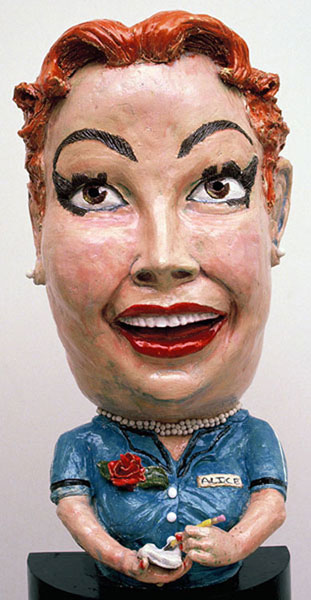“Alice gets a job”
(Portrait of Audrey Meadows as
Alice Kramden in The Honeymooners)
Ceramic
39″ x 23″ x 29″
1999
Details
![]()

“Alice gets a job”
(Portrait of Audrey Meadows as
Alice Kramden in The Honeymooners)
Ceramic
39″ x 23″ x 29″
1999
Details
![]()
As a child, we watched a television show entitled the Honeymooners. It starred Jackie Gleason as Ralph Kramden an overweight; loud and very opinionated man who was married to Audrey Meadows who played his wife Alice. During the days that this program aired women were portrayed as mothers, wives, and happy homemakers. They had no opinions, made no fuss and everything was a neat and tidy package of dribble. The character played by Meadows, Alice, was very different from the rest of the housewives on television. She stood up for what she believed, she was not afraid of her loud overbearing husband. She was wise, firm, loving, and still was able to be feminine. I admired the character of Alice and was drawn to sculpting her and immortalizing her in clay.
For Tony, television was a constant companion and source of entertainment during his young adult life. Unsurprisingly, he chose to honor some of the small-screen characters who left lasting impressions. Alice Gets a Job is a tribute to the actress Audrey Meadows who played Alice Kramden, a stay-at-home housewife, in The Honeymooners’ sitcom for thirty-nine episodes from 1955-1956. (The episodes were later rebroadcast in syndicated reruns.) Jackie Gleason was the star of the half-hour show and played the role of Alice’s husband, Ralph Kramden, an overbearing, overweight bus driver living a blue-collar life and harboring schemes to get rich quickly. Tony admired Audrey Meadows and wanted to “immortalize her in clay” because he felt she gave dimension to the TV portrayal of the 1950s housewife, who was
often depicted as the happy homemaker: “Alice stood up for what she believed and was not afraid to stand her ground.” Tony believed that presenting the character of Alice as a waitress who held a job was a way to empower her and give her a sense of independence. Sculpting Alice as the waitress was Tony’s way of acknowledging her work as a homemaker, keeping the household functioning, although this was daily work for which she was not compensated.